
Wer viel auf den Beinen ist – ob bei der Arbeit, beim Sport oder im Alltag – kennt das Problem müder Füße nur allzu gut. Der ständige Druck und die Belastung können zu Schmerzen, Beschwerden und sogar langfristigen Fußproblemen führen. Doch was wäre, wenn Sie diese Beschwerden mit einer einfachen Maßnahme beseitigen könnten? Entdecken Sie die Welt der hochwirksamen Stützeinlegesohlen .
In diesem Blogbeitrag erfahren Sie mehr über die Vorteile von hochbelastenden Stützsohlen, warum sie so wichtig sind, um Fußermüdung vorzubeugen, und wie Sie die besten Einlegesohlen für ganztägigen Tragekomfort auswählen. Verabschieden Sie sich von Fußschmerzen und -ermüdung – los geht's!
Warum benötigen übergewichtige Menschen spezielle Einlegesohlen?
Den Druck auf die Füße verringern
Übergewicht kann die Gesundheit Ihrer Füße erheblich beeinträchtigen, insbesondere im Hinblick auf die langfristige Abnutzung durch alltägliche Aktivitäten.
Übergewicht belastet Ihre Füße bei jedem Schritt stärker. Dieser zusätzliche Druck kann die natürliche Körperhaltung beeinträchtigen, insbesondere die von Fußgewölbe, Fersen und Zehen.
Spezielle Einlegesohlen sind so konzipiert, dass sie den Druck gleichmäßig über den Fuß verteilen, das Risiko einer Überlastung bestimmter Bereiche verringern und die Schmerzen lindern, die oft mit Übergewicht einhergehen.
Vorbeugung von Fußerkrankungen
Übergewicht steht in Zusammenhang mit verschiedenen Fußerkrankungen, darunter Plantarfasziitis , Fersensporn und Plattfüße . Übergewichtige Menschen sind aufgrund der zusätzlichen Belastung ihrer Füße anfälliger für diese Probleme.
Bei einer Plantarfasziitis entzündet sich das Gewebeband, das das Fußgewölbe stützt, was zu starken Fersenschmerzen führt.
Stützende Einlegesohlen mit Dämpfung und Fußgewölbeunterstützung können die mit diesen Erkrankungen verbundenen Beschwerden verhindern oder lindern, indem sie den Fuß neu ausrichten und zusätzliche Unterstützung dort bieten, wo sie am meisten benötigt wird.
Polsterung zur Stoßdämpfung
Beim Gehen, Laufen oder sogar Stehen wird bei jedem Schritt die Fuß-, Knie- und Lendenwirbelsäule stark belastet. Bei übergewichtigen Personen kann diese Belastung noch ausgeprägter sein, was zu Ermüdung und Gelenkverspannungen führen kann.
Hochwertige Einlegesohlen mit fortschrittlichen, stoßdämpfenden Materialien wie Memory-Schaum oder Gel dämpfen den Aufprall bei jedem Schritt und schützen so nicht nur Ihre Füße, sondern auch Ihre Gelenke. Diese zusätzliche Polsterung trägt spürbar dazu bei, die Fußermüdung im Laufe des Tages zu reduzieren.
Verbesserte Körperhaltung und Ausrichtung
Übergewicht kann mitunter zu einer schlechten Körperhaltung führen, da der Körper den zusätzlichen Druck auf Füße und Beine ausgleicht. Mit der Zeit können Fehlstellungen Knie, Hüfte und unteren Rücken beeinträchtigen.
Spezielle Einlegesohlen fördern die korrekte Fußstellung, indem sie das Fußgewölbe stützen, die Fußhaltung verbessern und einen biomechanisch optimalen Schrittablauf gewährleisten. Durch die Korrektur von Fehlstellungen können die richtigen Einlegesohlen Schmerzen in anderen Bereichen wie Knien, unterem Rücken und sogar Hüften lindern.
Stabilität und Gleichgewicht
Übergewichtige Menschen können Gleichgewichts- und Stabilitätsprobleme haben, insbesondere beim längeren Stehen oder Gehen. Spezielle Einlegesohlen mit zusätzlicher Fußgewölbeunterstützung und Fersenstabilisierung können Beschwerden durch Instabilität vorbeugen.
Sie bieten eine stabilere Basis für den Fuß, was das allgemeine Gleichgewicht verbessern und das Risiko von Stürzen und Verletzungen verringern kann, insbesondere bei Menschen, die lange stehen oder gehen.

Wie bieten hochbelastbare Einlegesohlen Halt und Komfort?
Stoßdämpfung und Aufprallschutz
Eine der Hauptfunktionen von hochbelastbaren Einlegesohlen besteht darin, den Stoß bei jedem Schritt abzufedern und so die Belastung für Füße und Gelenke zu reduzieren.
Für den Einsatz unter hoher Belastung konzipierte Einlegesohlen enthalten oft Materialien wie Memory-Schaum, Gel oder EVA-Schaum, die die Füße dämpfen und als Puffer zwischen den Füßen und dem Boden dienen.
Diese stoßdämpfenden Materialien reduzieren die Belastung von Füßen, Gelenken und Wirbelsäule und sorgen so für ein weicheres und kontrollierteres Schrittgefühl. Dies ist besonders wichtig für Menschen mit höherem Gewicht oder solche, die Sportarten mit hoher Belastung ausüben.
Robuste Konstruktion für langanhaltenden Komfort
Hochleistungs-Einlegesohlen sind so konzipiert, dass sie den Belastungen in stark beanspruchten Umgebungen standhalten. Diese Einlegesohlen werden aus strapazierfähigen Materialien gefertigt, die nicht nur Komfort bieten, sondern auch eine längere Lebensdauer als herkömmliche Einlegesohlen aufweisen.
Egal ob Sie 8, 10 oder 12 Stunden am Tag auf den Beinen sind, diese Einlegesohlen behalten ihre Struktur, Dämpfung und Wirksamkeit den ganzen Tag über.
Im Gegensatz zu weicheren, weniger haltbaren Einlegesohlen sind die robusten Ausführungen so konzipiert, dass sie ihre stoßdämpfenden Eigenschaften und ihre Polsterung über Monate oder sogar Jahre beibehalten. Damit sind sie eine sinnvolle Investition für Menschen, die bei der Arbeit auf Komfort und Leistung angewiesen sind.
Fersen- und Vorfußdämpfung
Viele hochbelastbare Einlegesohlen bieten neben einer allgemeinen Unterstützung des Fußgewölbes auch gezielte Dämpfung im Fersen- und Vorfußbereich. Da die Ferse beim Gehen den größten Teil des Aufpralls abfängt, ist eine ausreichende Dämpfung in diesem Bereich unerlässlich, um Beschwerden und Verletzungen vorzubeugen.
Durch gezielte Unterstützung an den Stellen, wo sie am meisten benötigt wird, tragen hochbelastbare Einlegesohlen dazu bei, Schmerzen und Ermüdung in den empfindlichsten Bereichen des Fußes vorzubeugen.
Atmungsaktivität und Feuchtigkeitsregulierung
Komfort bedeutet nicht nur Dämpfung und Unterstützung, sondern auch, die Füße trocken und kühl zu halten. Wer den ganzen Tag auf den Beinen ist, riskiert durch Schweißbildung Feuchtigkeit, die zu Beschwerden, unangenehmen Gerüchen und sogar Fußproblemen wie Blasen oder Pilzinfektionen führen kann.
Um dem entgegenzuwirken, sind viele strapazierfähige Einlegesohlen mit atmungsaktiven Materialien oder feuchtigkeitsableitender Technologie ausgestattet. Einlegesohlen aus Mesh-Gewebe oder offenzelligem Schaumstoff ermöglichen die Luftzirkulation, reduzieren die Schweißbildung und sorgen dafür, dass Ihre Füße kühl und trocken bleiben.
Manche Einlegesohlen sind sogar mit antimikrobiellen Eigenschaften ausgestattet, die dazu beitragen, geruchsverursachende Bakterien zu verhindern und so dafür sorgen, dass Ihre Füße den ganzen Tag frisch bleiben.
Wer benötigt Einlegesohlen mit hoher Stützfunktion?
Menschen mit einem aktiven Lebensstil
Wer gerne aktiv ist – ob beim Spazierengehen, Joggen oder Wandern – weiß, dass die Füße dabei stark beansprucht werden. Regelmäßige Bewegung ist zwar gut für die allgemeine Gesundheit, doch die ständige Belastung durch harte Oberflächen kann mit der Zeit zu Fußermüdung, Gelenkschmerzen und Verletzungen führen.
Hochwertige Einlegesohlen dämpfen jeden Schritt, absorbieren Stöße und verbessern die Ausrichtung, sodass Sie länger schmerzfrei auf den Beinen bleiben können.
Egal ob Sie für einen Marathon trainieren, eine Wochenendwanderung genießen oder einfach nur spazieren gehen, um fit zu bleiben – stützende Einlegesohlen bieten zusätzlichen Schutz.
Arbeiter mit anspruchsvollen Jobs
Für Menschen, die in körperlich anstrengenden Berufen arbeiten und lange auf den Beinen sind, wie beispielsweise im Baugewerbe, im Gesundheitswesen oder im Einzelhandel, können hochbelastbare Einlegesohlen einen großen Unterschied machen. Diese Berufsgruppen stehen oder gehen oft über längere Zeiträume auf harten Oberflächen, was Füße, Beine und den unteren Rücken stark belastet.
Durch verbesserte Unterstützung des Fußgewölbes, Stoßdämpfung und Polsterung können hochbelastbare Einlegesohlen Beschwerden reduzieren, Verletzungen vorbeugen und dafür sorgen, dass sich die Arbeiter während ihrer Schichten leichter und komfortabler bewegen können.
Menschen mit Fußerkrankungen
Bestimmte Fußprobleme wie Plattfüße, Hohlfüße, Plantarfasziitis oder Hallux valgus können erhebliche Beschwerden verursachen und die Beweglichkeit einschränken. Für Betroffene ist das Tragen von stützenden Einlegesohlen mit hoher Festigkeit nicht nur eine Frage des Komforts, sondern unerlässlich zur Schmerzlinderung und -behandlung. So funktioniert es:
Plattfüße: Menschen mit Plattfüßen leiden häufig unter Überpronation, d. h. die Füße rollen beim Gehen nach innen. Hochwertige Einlegesohlen bieten zusätzliche Unterstützung des Fußgewölbes, um den Fuß auszurichten und Beschwerden vorzubeugen.
Plantarfasziitis: Diese häufige Erkrankung verursacht Schmerzen in der Ferse und Fußsohle. Spezielle Einlegesohlen für hohe Beanspruchung bieten Stoßdämpfung und Unterstützung und tragen so zur Entlastung des Plantarfaszienbandes bei.
Hohe Fußgewölbe: Füße mit hohem Fußgewölbe haben weniger natürliche Dämpfung, was zu erhöhtem Druck auf Fersen und Fußballen führt. Hochwertige Einlegesohlen bieten Dämpfung, verteilen den Druck gleichmäßiger und sorgen für Entlastung.
Hallux valgus: Menschen mit Hallux valgus können von Einlagen profitieren, die den Druck umverteilen und eine zusätzliche Belastung des Gelenks verhindern.
Übergewichtige oder fettleibige Personen
Übergewicht kann die Füße, insbesondere Fußgewölbe, Fersen und Knöchel, stark belasten. Hochwertige Stützeinlegesohlen bieten die notwendige Stoßdämpfung, um die Belastung von Füßen und Gelenken zu reduzieren und so längeres Gehen und Stehen schmerzfreier zu gestalten.
Für übergewichtige oder fettleibige Menschen kann die Investition in strapazierfähige Einlegesohlen ein wesentlicher Bestandteil der Erhaltung der Fußgesundheit und des Fußkomforts sein.
Sportler und Sportbegeisterte
Sportler aller Art – ob Profis oder Amateure – belasten ihre Füße häufig stark beim Laufen, Springen und schnellen Bewegungen. Dies kann mit der Zeit zu Fußermüdung, Ermüdungsbrüchen und anderen Verletzungen führen.
Hochleistungs-Einlegesohlen, die speziell für Sportler entwickelt wurden, helfen, die Füße vor den wiederholten Belastungen bei sportlichen Aktivitäten zu schützen.
Laufschuhe profitieren von robusten Einlegesohlen, die zusätzliche Dämpfung bieten und so die Belastung der Füße reduzieren. Diese Einlegesohlen bieten zusätzlichen Schutz und Komfort, beugen Verletzungen vor und verbessern die Laufleistung.

Vorteile von hochbelastbaren Stützeinlegesohlen gegenüber herkömmlichen Einlegesohlen
Verbesserte Polsterung für zusätzlichen Komfort
Einer der Hauptvorteile von hochbelastbaren Stützsohlen ist ihre hervorragende Dämpfung. Herkömmliche Einlegesohlen bestehen in der Regel aus dünnem Schaumstoff oder einfachen Materialien, die nur minimalen Komfort bieten. Dies ist möglicherweise nicht ausreichend für Menschen, die lange auf den Beinen sind, wie beispielsweise Bauarbeiter, Pflegekräfte oder Sportler.
Bessere Unterstützung des Fußgewölbes für eine korrekte Ausrichtung
Hochleistungs-Einlegesohlen sind speziell dafür entwickelt, eine optimale Unterstützung des Fußgewölbes zu bieten, was für Menschen mit Plattfüßen, hohen Fußgewölben oder Pronationsproblemen unerlässlich ist.
Normale Einlegesohlen bieten zwar eine grundlegende Unterstützung des Fußgewölbes, aber es mangelt ihnen oft an den erweiterten Funktionen, die für eine ordnungsgemäße Stabilisierung des Fußes erforderlich sind, insbesondere in Fällen, in denen eine stärkere Unterstützung notwendig ist.
Stoßdämpfung zum Schutz vor Aufprall
Hochleistungs-Einlegesohlen sind so konzipiert, dass sie Stöße besser absorbieren als normale Einlegesohlen. Dies ist besonders vorteilhaft für Menschen, die Aktivitäten mit hoher Belastung ausüben, wie Laufen, Springen oder Arbeiten auf harten Oberflächen.
Normale Einlegesohlen bieten in der Regel eine gewisse Stoßdämpfung, sind aber nicht für intensive körperliche Aktivitäten oder langes Verweilen auf harten Böden optimiert.
Längere Haltbarkeit für längere Nutzung
Während sich normale Einlegesohlen bei täglichem Gebrauch relativ schnell abnutzen können, werden hochbelastbare Stützeinlegesohlen aus strapazierfähigeren Materialien hergestellt, die den Anforderungen einer langfristigen Nutzung standhalten.
Egal ob Sie gehen, stehen oder auf harten Oberflächen laufen, robuste Einlegesohlen sind so konstruiert, dass sie ihre Form und Leistungsfähigkeit über die Zeit beibehalten und so dauerhaften Komfort bieten, ohne ihre Stützfunktion einzubüßen.
Verbesserte Stabilität und Bewegungssteuerung
Stabilisierungstechnologie hilft, die Fußbewegungen beim Gehen und Laufen zu kontrollieren.
Tiefe Fersenkappen und verstärkte Fußgewölbe sorgen für eine optimale Ausrichtung des Fußes.
Die Bewegungssteuerungsfunktionen helfen dabei, ein zu starkes Ein- oder Ausrollen des Fußes nach innen oder außen zu verhindern.
Durch diese erhöhte Stabilität verringert sich die Wahrscheinlichkeit von Gelenkschmerzen, Knöchelverstauchungen und anderen Verletzungen, die durch Fehlstellungen oder Instabilität verursacht werden.
Wie hochbelastbare Einlegesohlen die Fußgesundheit verbessern
Geringere Gelenkbelastung: Durch effektive Stoßdämpfung und gleichmäßige Gewichtsverteilung minimieren sie die Belastung von Füßen, Knöcheln, Knien und Hüften bei Aktivitäten wie Gehen, Stehen und Laufen. Dies kann Beschwerden wie Plantarfasziitis, Metatarsalgie und sogar Rückenschmerzen vorbeugen.
Verbesserte Körperhaltung: Eine optimale Fußgewölbeunterstützung trägt zu einer korrekten Fußausrichtung bei und fördert eine bessere Körperhaltung. Dies kann die Belastung des Rückens reduzieren und die gesamte Körpermechanik verbessern.
Verbesserte Stabilität: Merkmale wie Fersenkappen und Mittelfußpolster verbessern die Stabilität und verringern das Risiko von Knöchelverstauchungen und anderen Verletzungen.
Verringerte Fußermüdung: Durch die Bereitstellung von Dämpfung und Unterstützung können robuste Einlegesohlen die Fußermüdung deutlich reduzieren, insbesondere bei längerem Stehen oder Gehen.
Schmerzlinderung: Für Personen mit bestehenden Fußerkrankungen wie Plantarfasziitis oder Metatarsalgie können hochbelastbare Einlegesohlen die dringend benötigte Schmerzlinderung bieten und den allgemeinen Komfort verbessern.
Die richtigen, hochbelastbaren Stützeinlegesohlen für Ihre Bedürfnisse auswählen
Neutral: Ihr Fuß rollt beim Gehen oder Laufen leicht nach innen.
Anforderung: Achten Sie auf Einlegesohlen mit moderater Dämpfung und Flexibilität.
Überpronation (Plattfüße): Ihr Fuß rollt übermäßig nach innen.
Empfehlung: Wählen Sie Einlegesohlen mit Bewegungskontrollfunktionen, um das Fußgewölbe zu stützen und ein übermäßiges Einwärtsrollen zu reduzieren.
Unterpronation (Hoher Fußrücken): Ihr Fuß rollt kaum oder gar nicht nach außen.
Anforderung: Achten Sie auf Einlegesohlen mit guter Dämpfung und Flexibilität, die Stöße absorbieren und Halt bieten.
Berücksichtigen Sie Ihr Aktivitätsniveau:
Für den täglichen Gebrauch: Wählen Sie Einlegesohlen, bei denen Komfort und ganztägige Unterstützung im Vordergrund stehen.
Aktivitäten mit hoher Belastung: Wählen Sie Einlegesohlen mit verbesserter Stoßdämpfung und Haltbarkeit für Aktivitäten wie Laufen, Wandern oder schweres Heben.
Beruflich bedingt: Wählen Sie Einlegesohlen, die spezifische Unterstützung für Ihre Tätigkeit bieten, z. B. langes Stehen oder Arbeiten auf harten Oberflächen.
Ermitteln Sie Ihren spezifischen Bedarf:
Schmerzlinderung: Bei spezifischen Fußschmerzen (z. B. Plantarfasziitis, Metatarsalgie) sollten Sie nach Einlegesohlen mit gezielter Unterstützung für diese Bereiche suchen.
Stabilität: Wenn Sie Probleme mit der Stabilität des Sprunggelenks haben, sollten Sie Einlegesohlen mit Fersenkappen und verbesserter Stabilität in Betracht ziehen.
Dämpfung: Wenn Sie Wert auf Stoßdämpfung und Komfort legen, achten Sie auf Einlegesohlen mit mehreren Dämpfungsschichten.
Berücksichtigen Sie Ihr Gewicht:
Schwerere Personen: Wählen Sie Einlegesohlen mit verbesserter Dämpfung, starker Fußgewölbeunterstützung und strapazierfähiger Konstruktion, um dem erhöhten Druck standzuhalten.
Vor dem Kauf testen:
Probieren Sie nach Möglichkeit verschiedene Einlegesohlen in einem Geschäft an, um zu sehen, wie sie sich anfühlen. Laufen Sie damit herum, um Komfort und Stützwirkung zu beurteilen.
Lassen Sie sich von einem Fachmann beraten:
Ein Podologe oder ein zertifizierter Orthopädieschuhmacher kann Ihre Füße untersuchen, Ihren Gang analysieren und Ihnen die am besten geeigneten Einlegesohlen für Ihre spezifischen Bedürfnisse empfehlen.
Bewährte Verfahren für die Verwendung von hochbelastbaren Stützeinlagen
Richtige Passform:
Achten Sie auf einen festen Sitz: Die Einlegesohlen sollten bequem in Ihre Schuhe passen, ohne zu verrutschen oder Falten zu werfen.
Eventuell zuschneiden: Falls erforderlich, schneiden Sie die Einlegesohlen vorsichtig gemäß den Anweisungen des Herstellers zu, um die beste Passform für Ihre spezifische Schuhgröße zu erreichen.
Stufenweise Einführung:
Beginnen Sie langsam: Tragen Sie die Einlegesohlen zunächst nur kurz und verlängern Sie die Tragezeit allmählich, sobald sich Ihre Füße daran gewöhnt haben. So minimieren Sie anfängliche Beschwerden oder Reizungen.
Auf Unbehagen achten:
Achten Sie genau darauf: Seien Sie sich jeglicher Beschwerden bewusst, wie z. B. Druckstellen, Druckpunkte oder verstärkte Schmerzen.
Bei Bedarf die Anwendung abbrechen: Sollten Sie Beschwerden verspüren, beenden Sie die Anwendung der Einlegesohlen und konsultieren Sie einen Podologen oder einen zertifizierten Orthopädieschuhmacher.
Regelmäßige Reinigung:
Halten Sie sie sauber: Waschen Sie Ihre Einlegesohlen regelmäßig mit milder Seife und Wasser.
Gründlich an der Luft trocknen lassen: Lassen Sie sie vollständig an der Luft trocknen, bevor Sie sie wieder in Ihre Schuhe einsetzen.
Bei Bedarf ersetzen:
Auf Abnutzung prüfen: Untersuchen Sie Ihre Einlegesohlen regelmäßig auf Anzeichen von Abnutzung, wie z. B. Abflachung der Polsterung, Risse oder Einrisse.
Bei Bedarf austauschen: Tauschen Sie Ihre Einlegesohlen alle 3 bis 6 Monate aus, oder früher, wenn sie abgenutzt sind oder keine ausreichende Unterstützung mehr bieten.
Ziehen Sie einen Fachmann hinzu:
Holen Sie sich fachkundigen Rat: Wenn Sie Bedenken bezüglich der Verwendung von hochbelastbaren Einlegesohlen haben oder anhaltende Beschwerden auftreten, wenden Sie sich für eine individuelle Beratung an einen Podologen oder einen zertifizierten Orthopädieschuhmacher.
Wichtiger Hinweis: Dies sind allgemeine Richtlinien. Beachten Sie stets die Anweisungen des Herstellers für spezifische Pflege- und Anwendungshinweise.
Top-Marken und Empfehlungen für hochbelastbare Stützeinlegesohlen
PCSsole hat sich in der Einlegesohlenindustrie schnell einen Namen gemacht, da das Unternehmen sich darauf konzentriert, Menschen, die lange auf den Beinen sind, erstklassigen Halt und Komfort zu bieten.
PCSsole Heavy Duty Support Full Length: Diese Einlegesohlen wurden für Personen entwickelt, die zusätzliche Unterstützung und Dämpfung benötigen. Sie bestehen aus einer Kombination von EVA-Schaum und PORON für eine verbesserte Stoßdämpfung.
PCSsole Comfort Cushion Max Full Length: Bietet maximale Dämpfung und Komfort mit einem zweilagigen Dämpfungssystem für ganztägige Unterstützung.
Wichtig: Wählen Sie die richtige PCSsole-Einlegesohle entsprechend Ihren individuellen Bedürfnissen und Ihrem Fußtyp.
Referenzen:
Waters TR, Dick RB. Nachweis von Gesundheitsrisiken im Zusammenhang mit langem Stehen am Arbeitsplatz und Wirksamkeit von Interventionen . Rehabil Nurs. 2015;40(3):148-165. doi:10.1002/rnj.166.


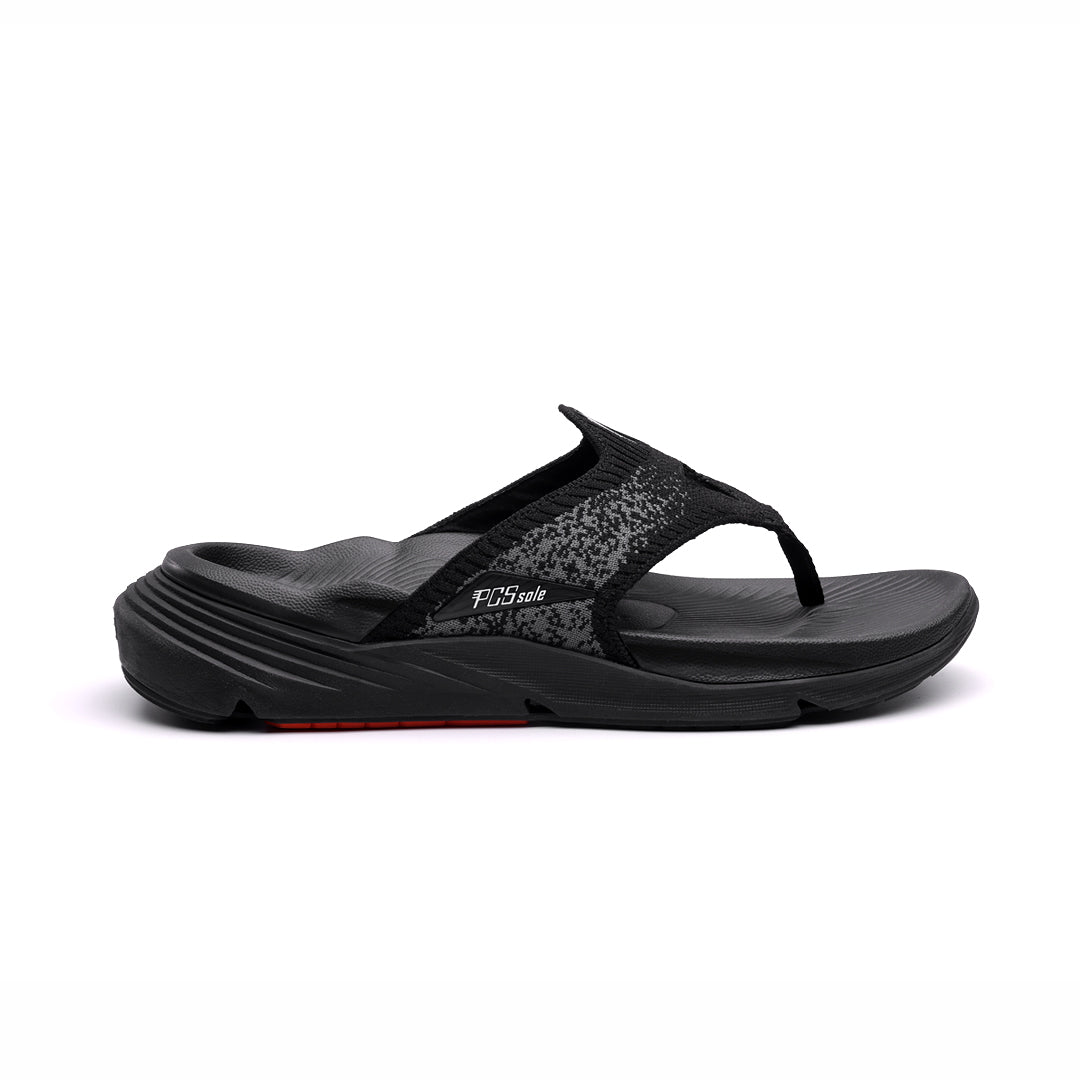

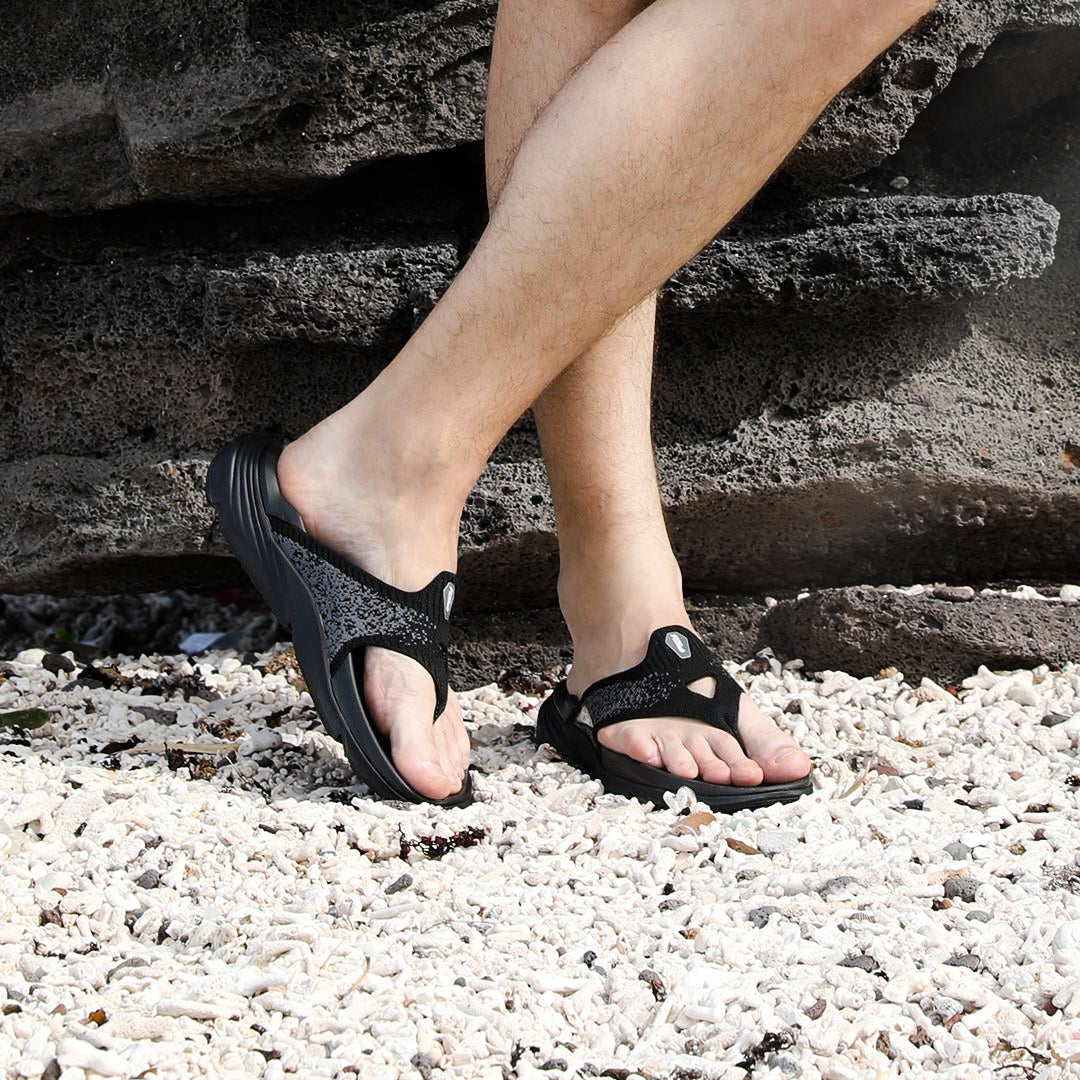
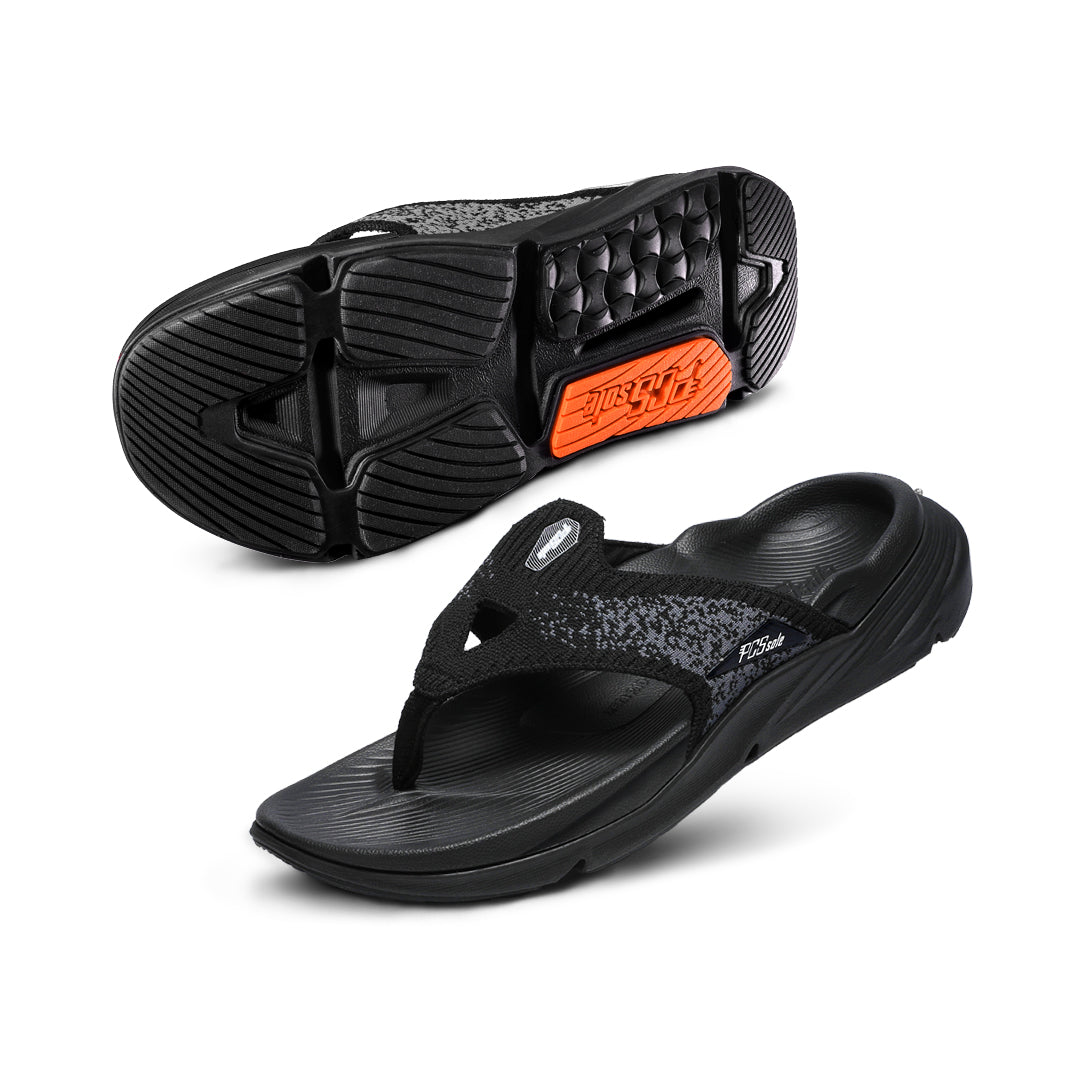
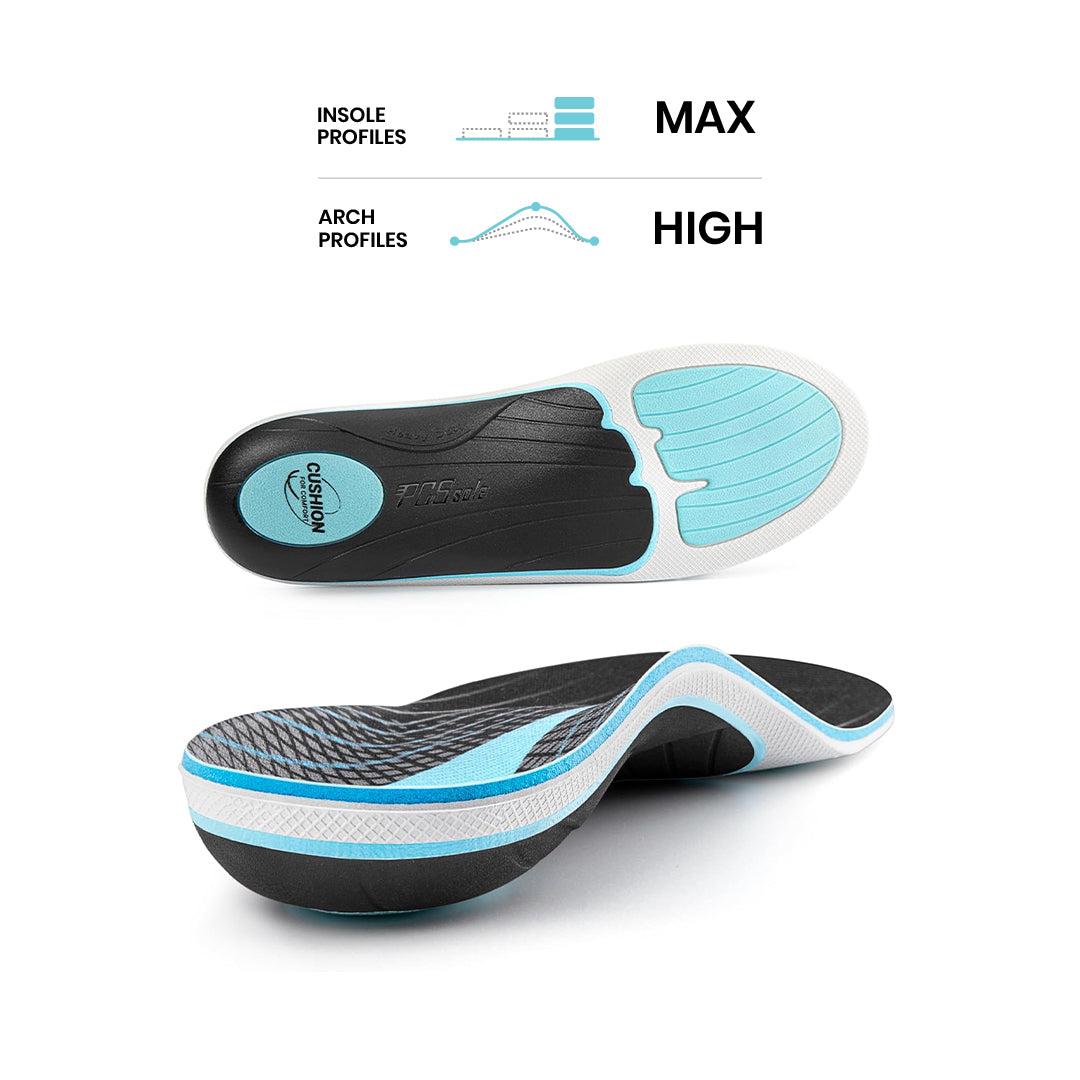
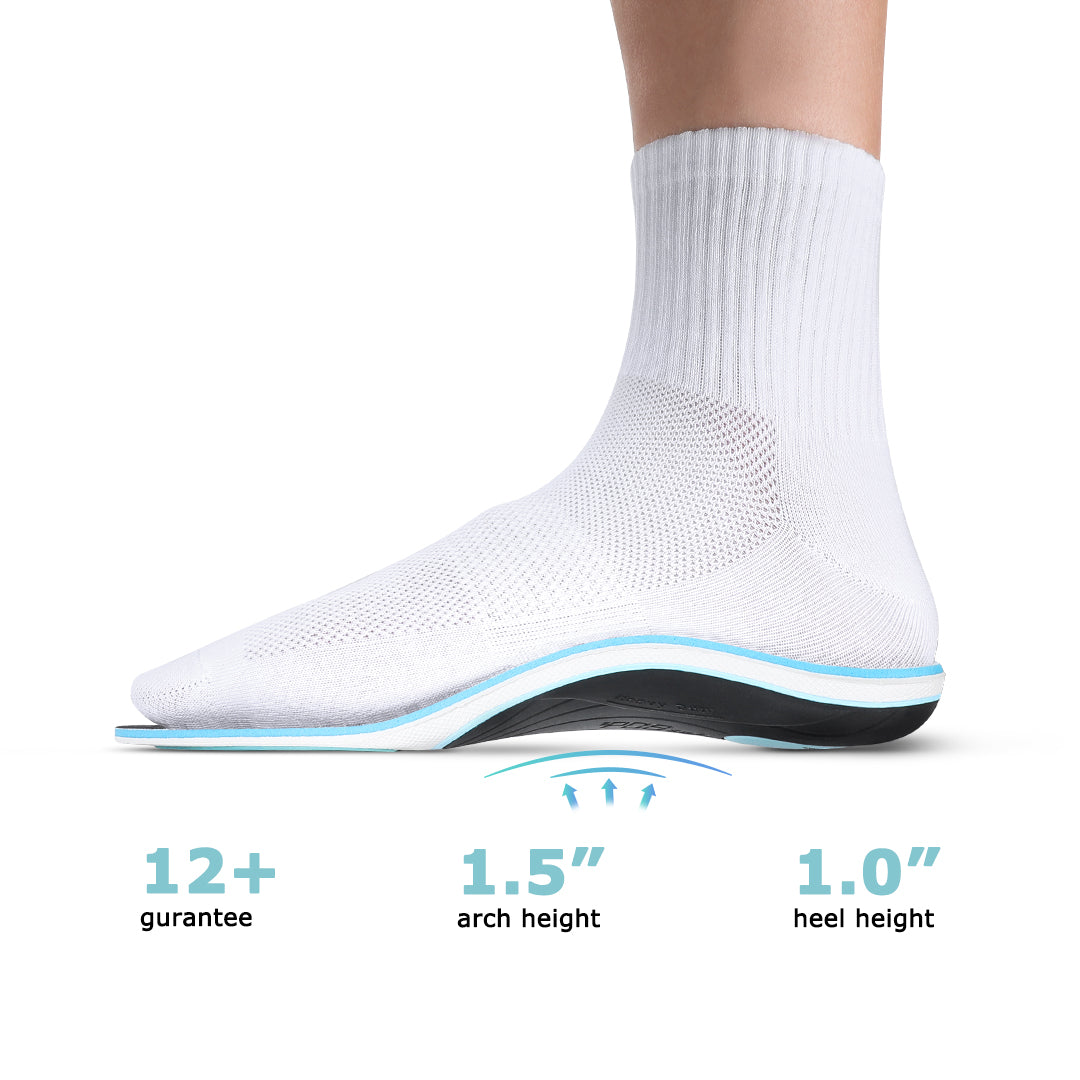
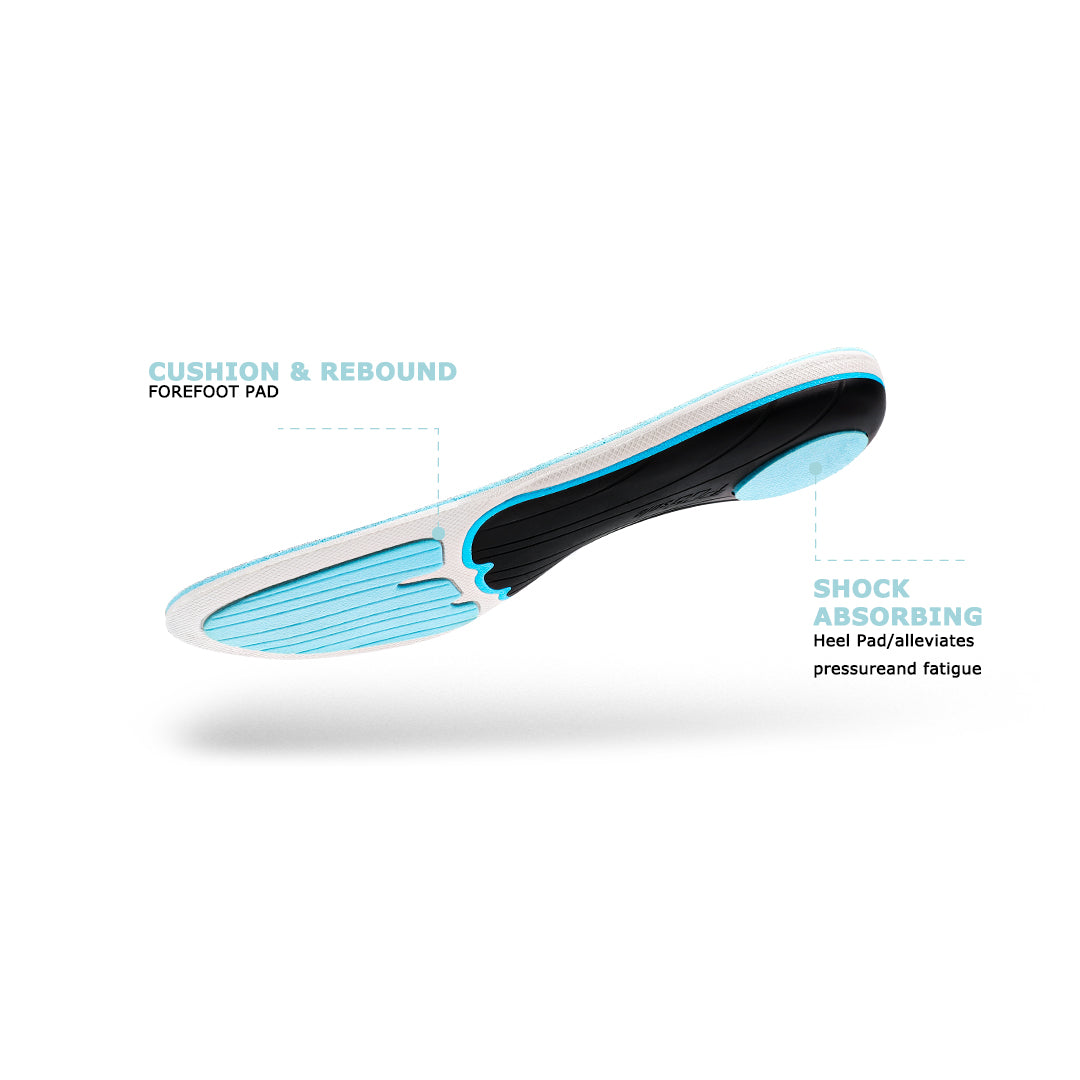
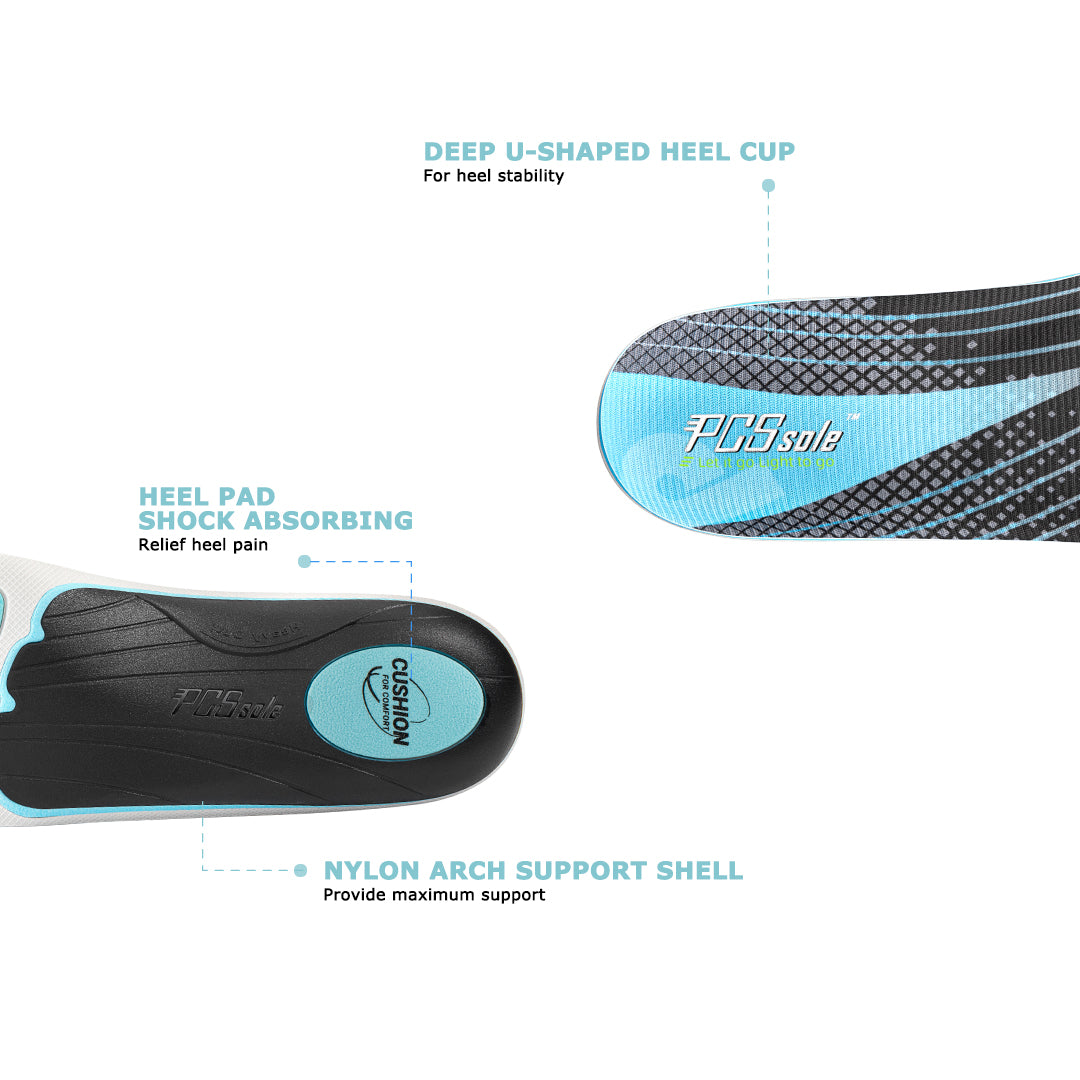
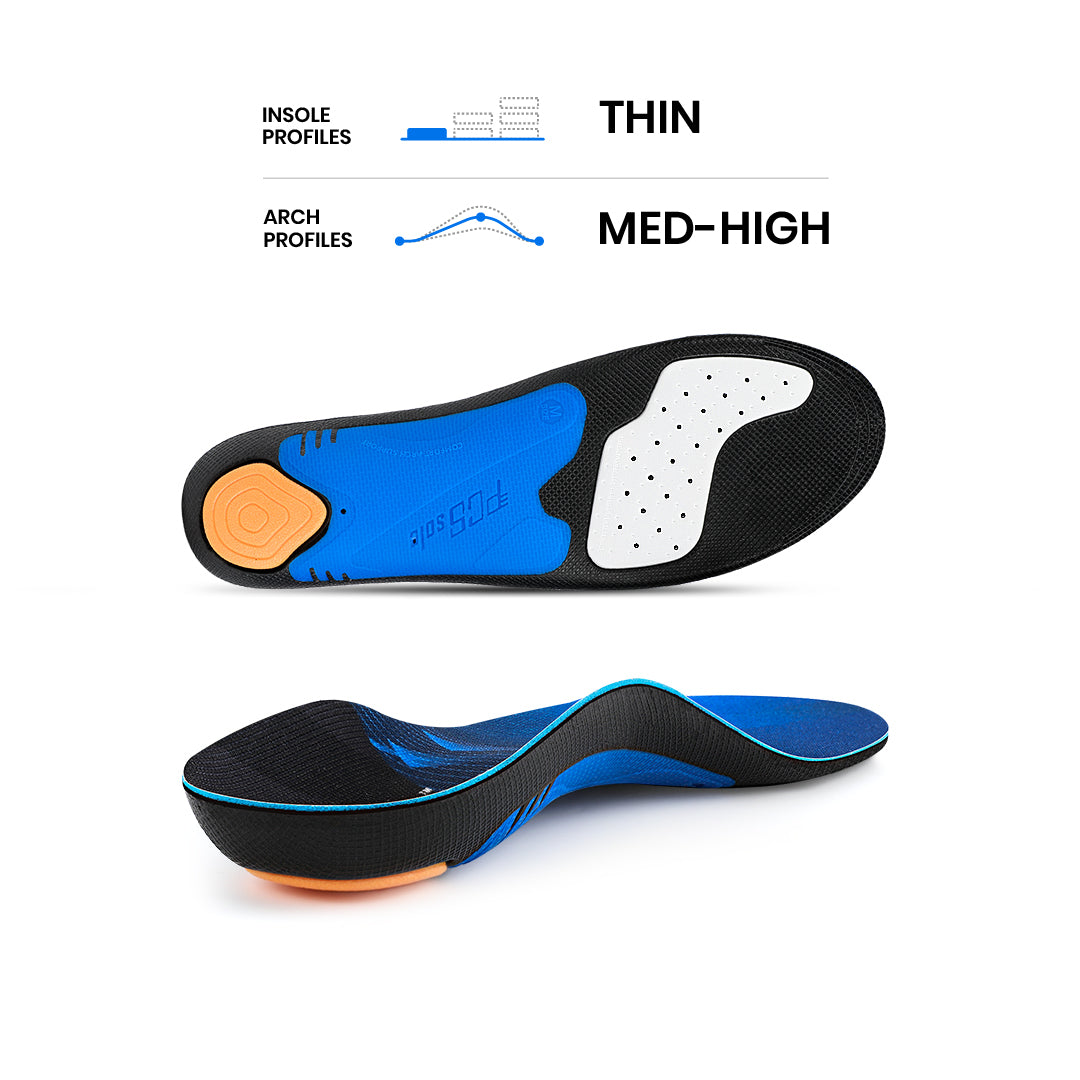
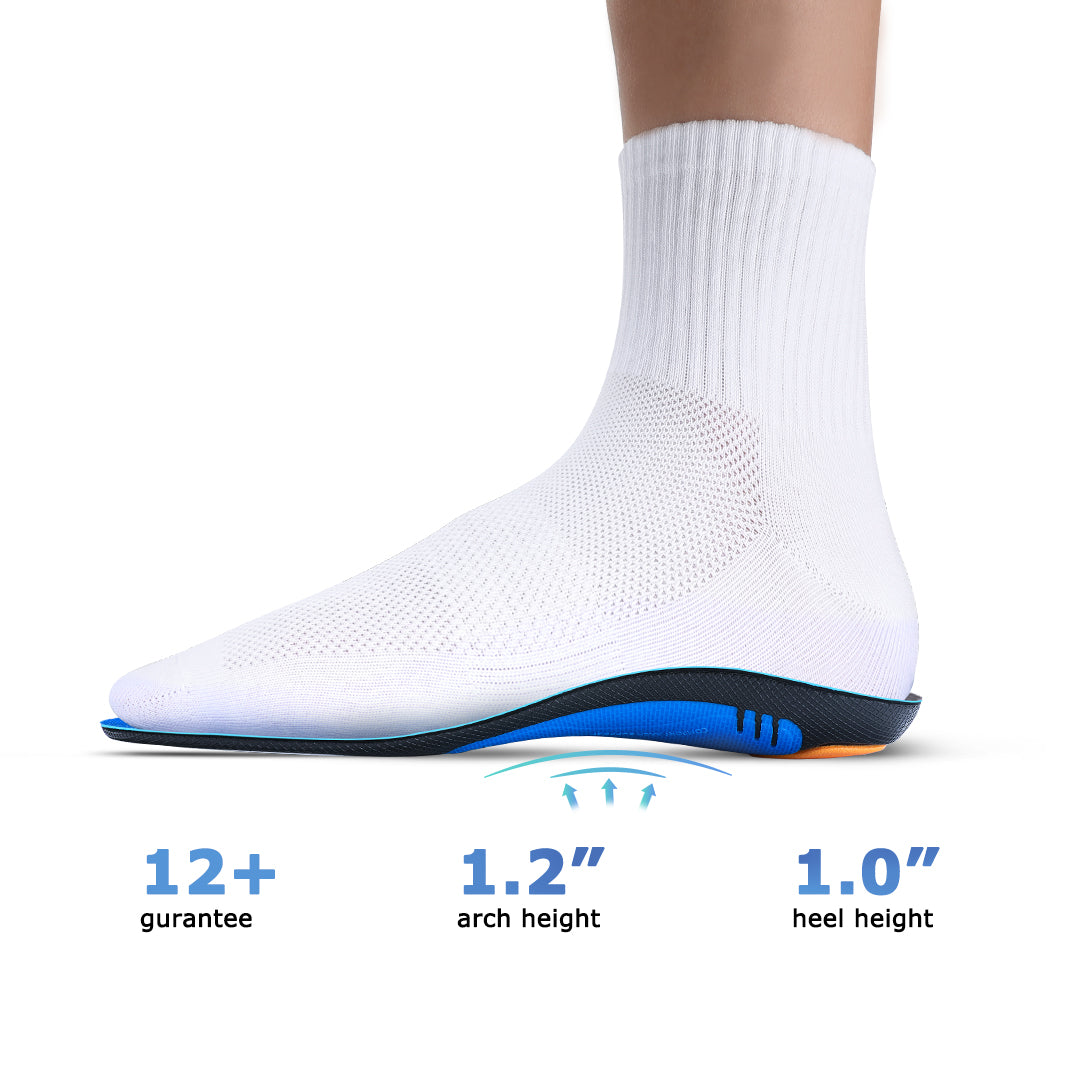
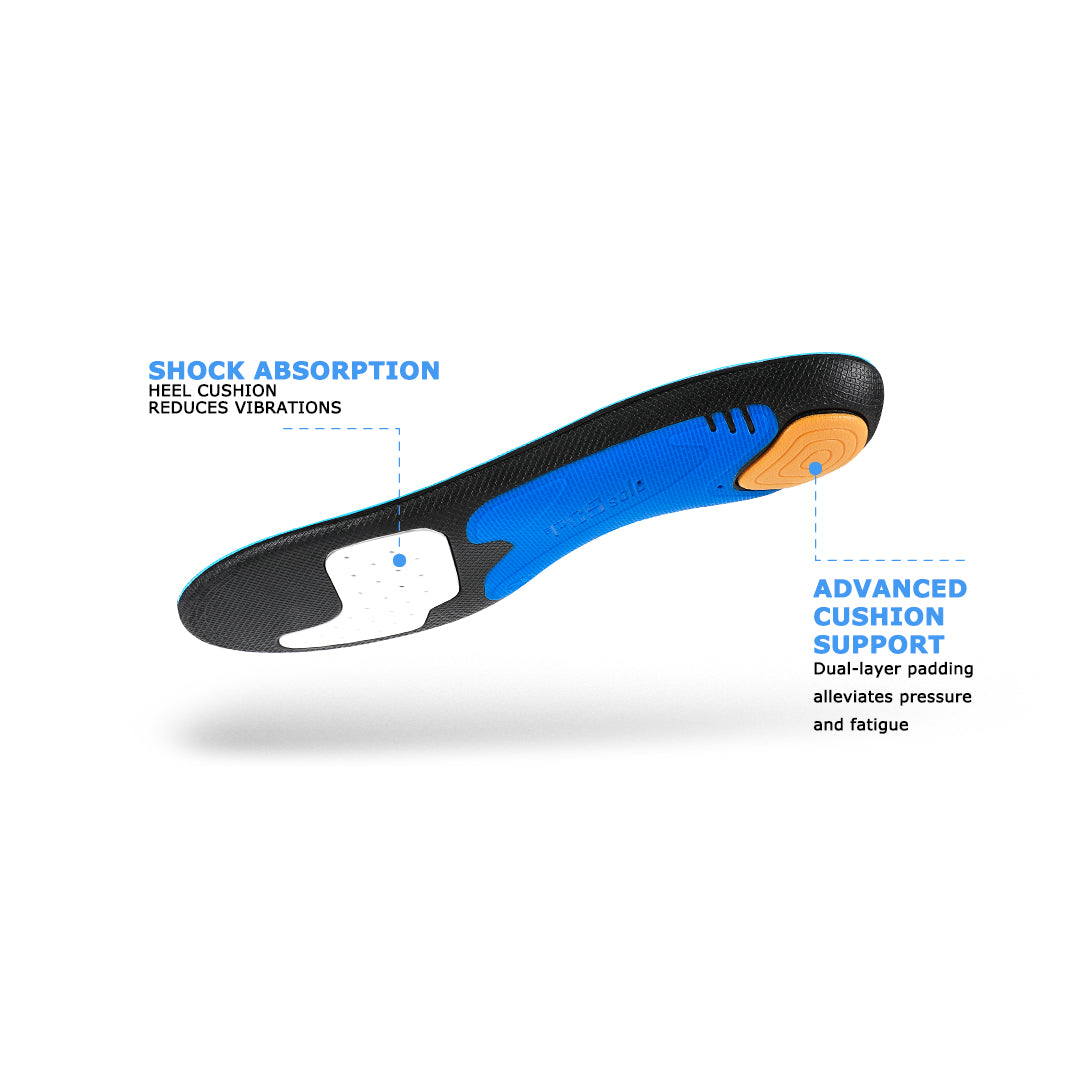
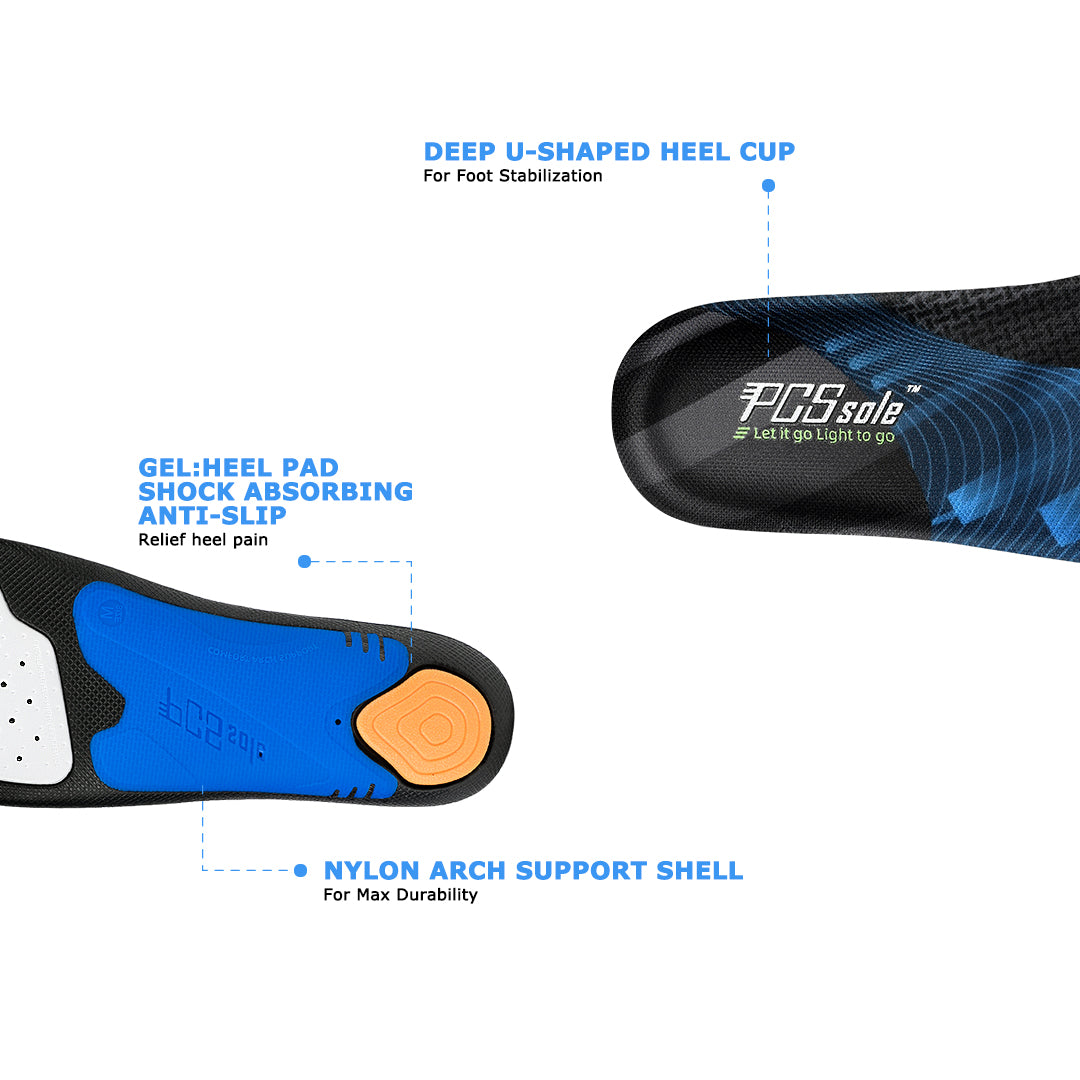
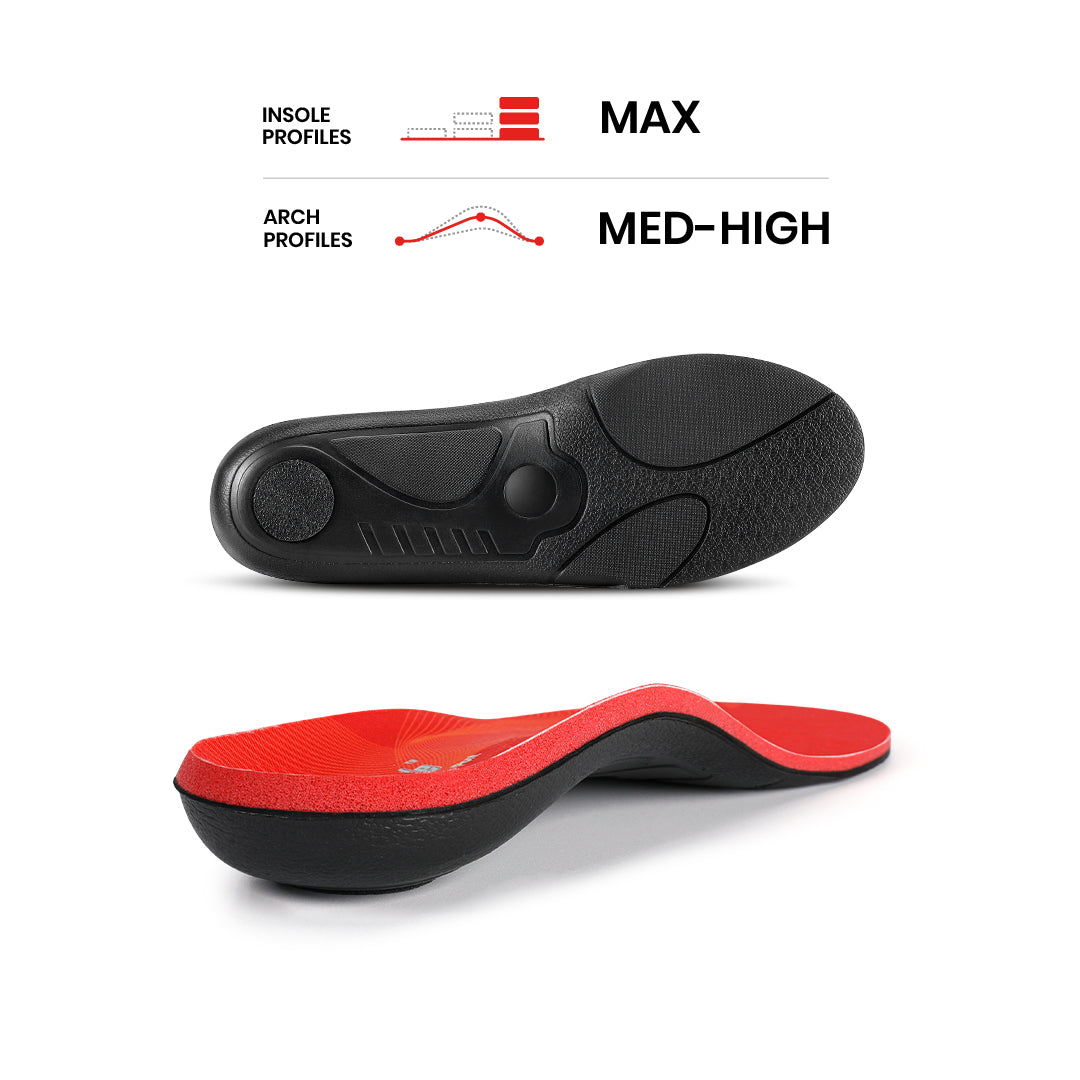
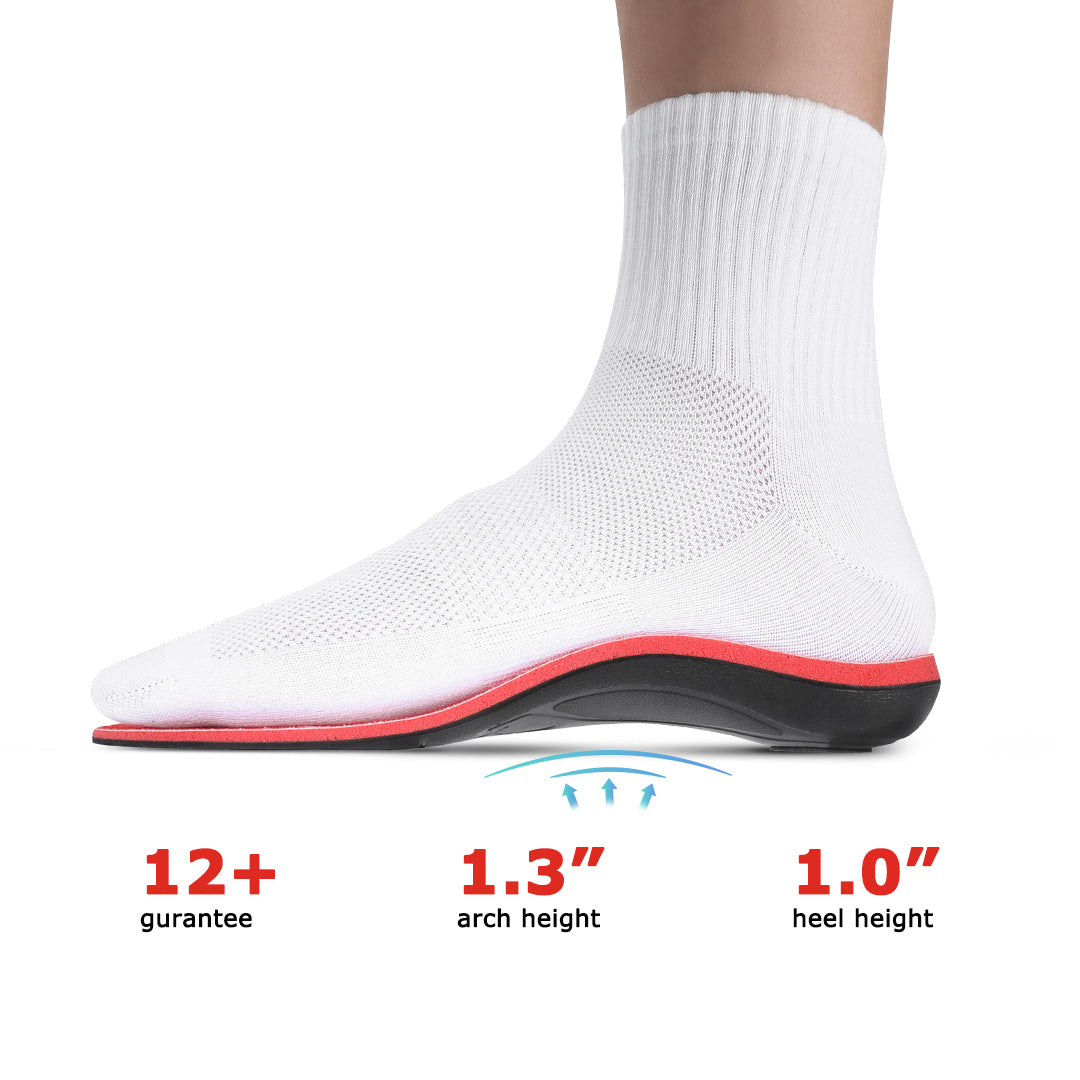
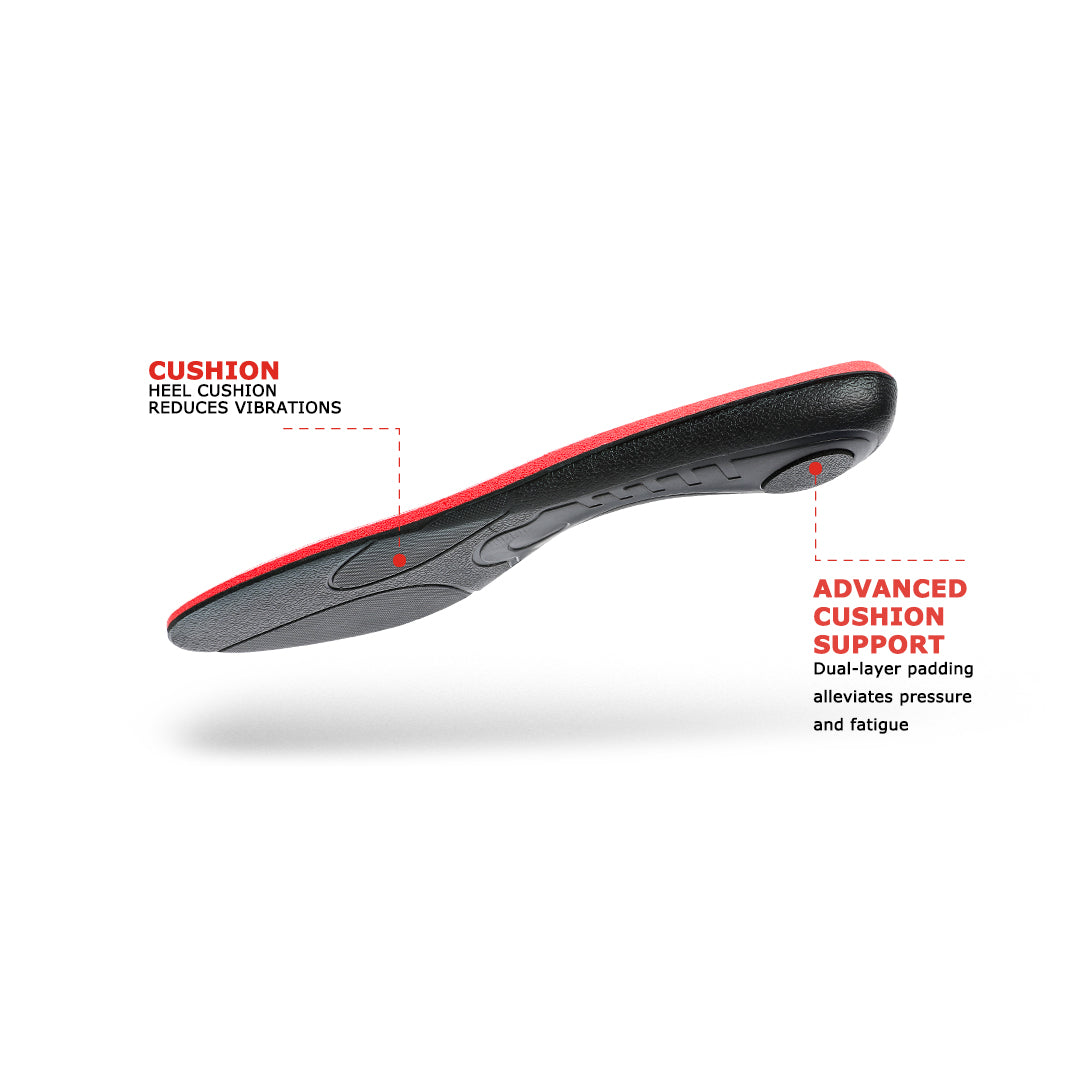
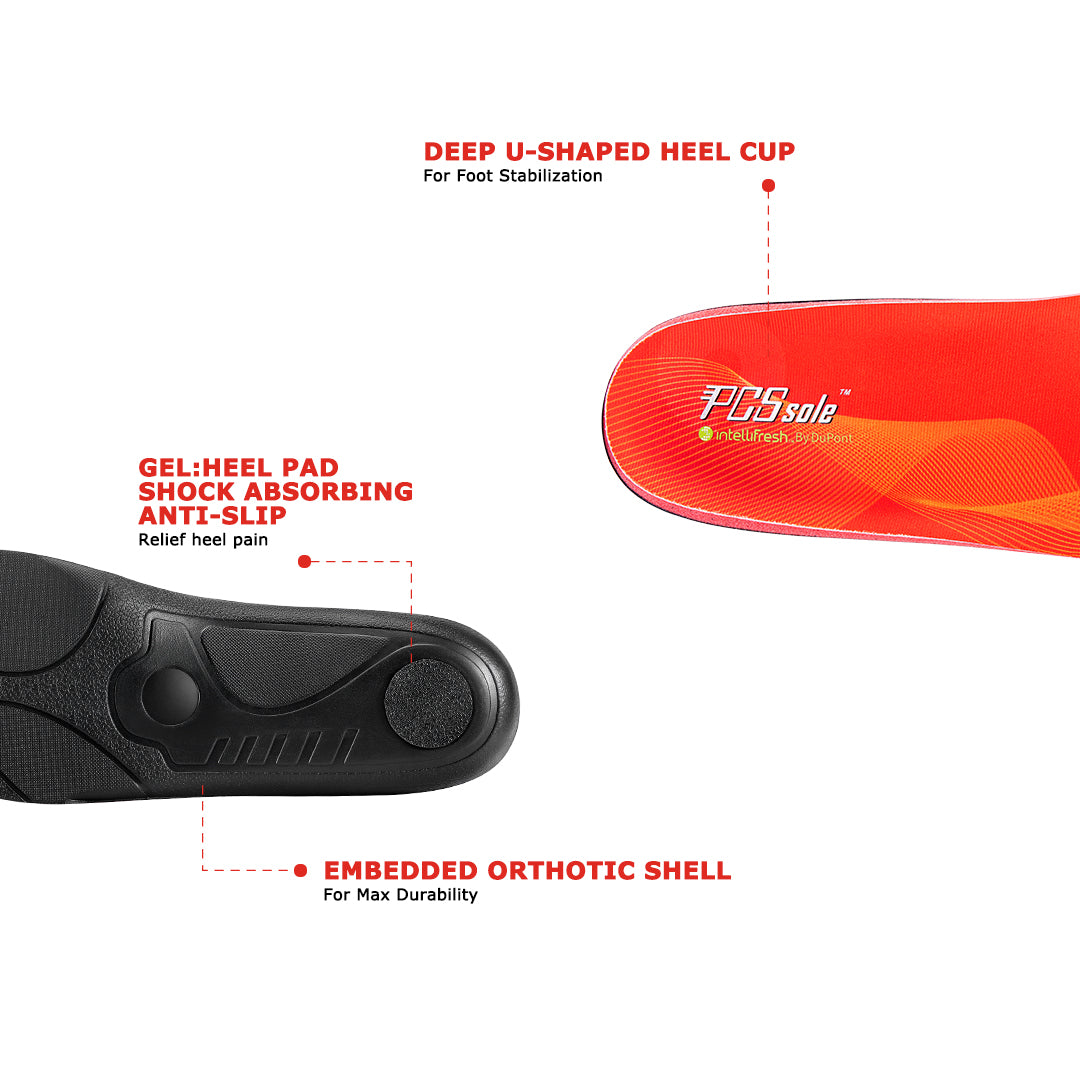
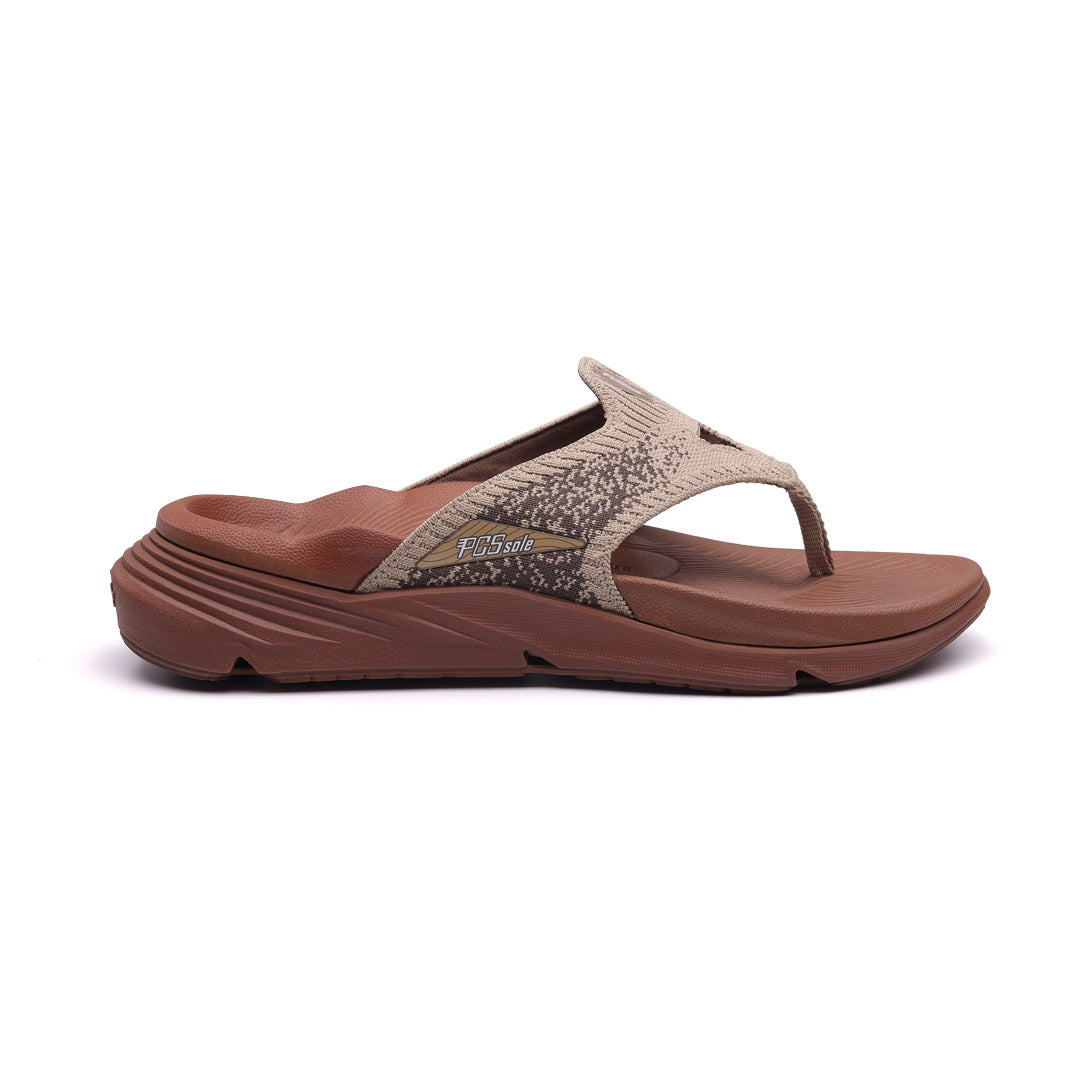


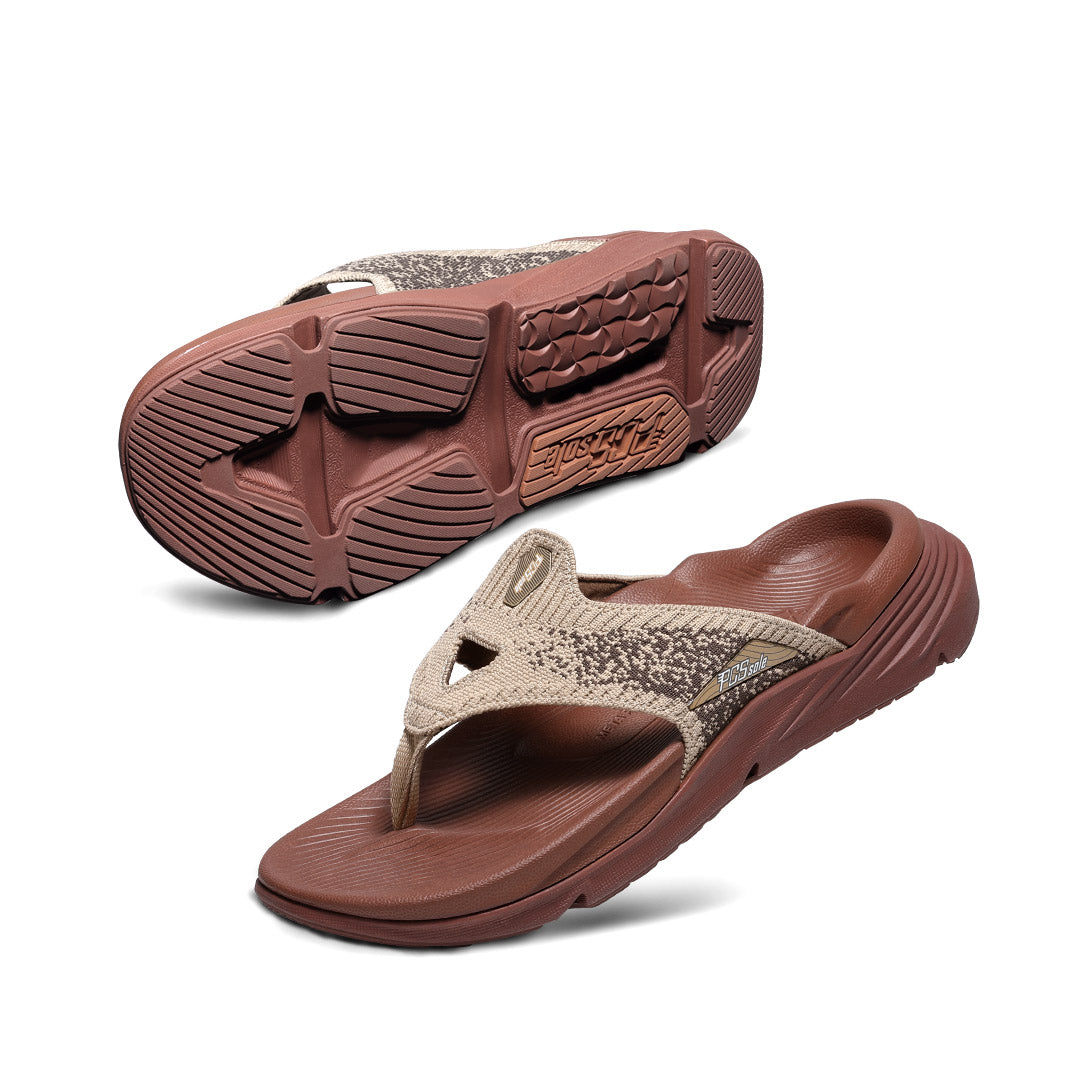
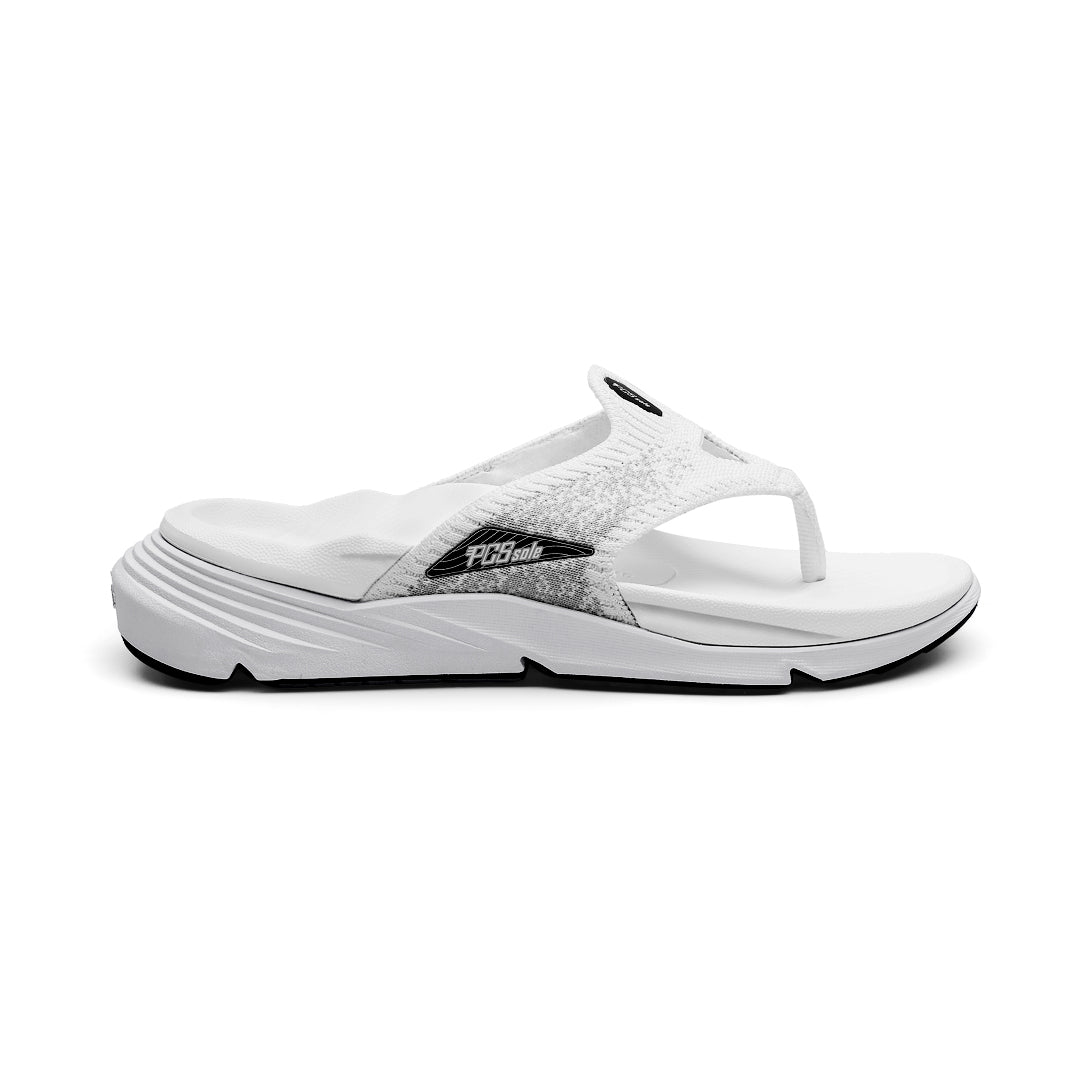

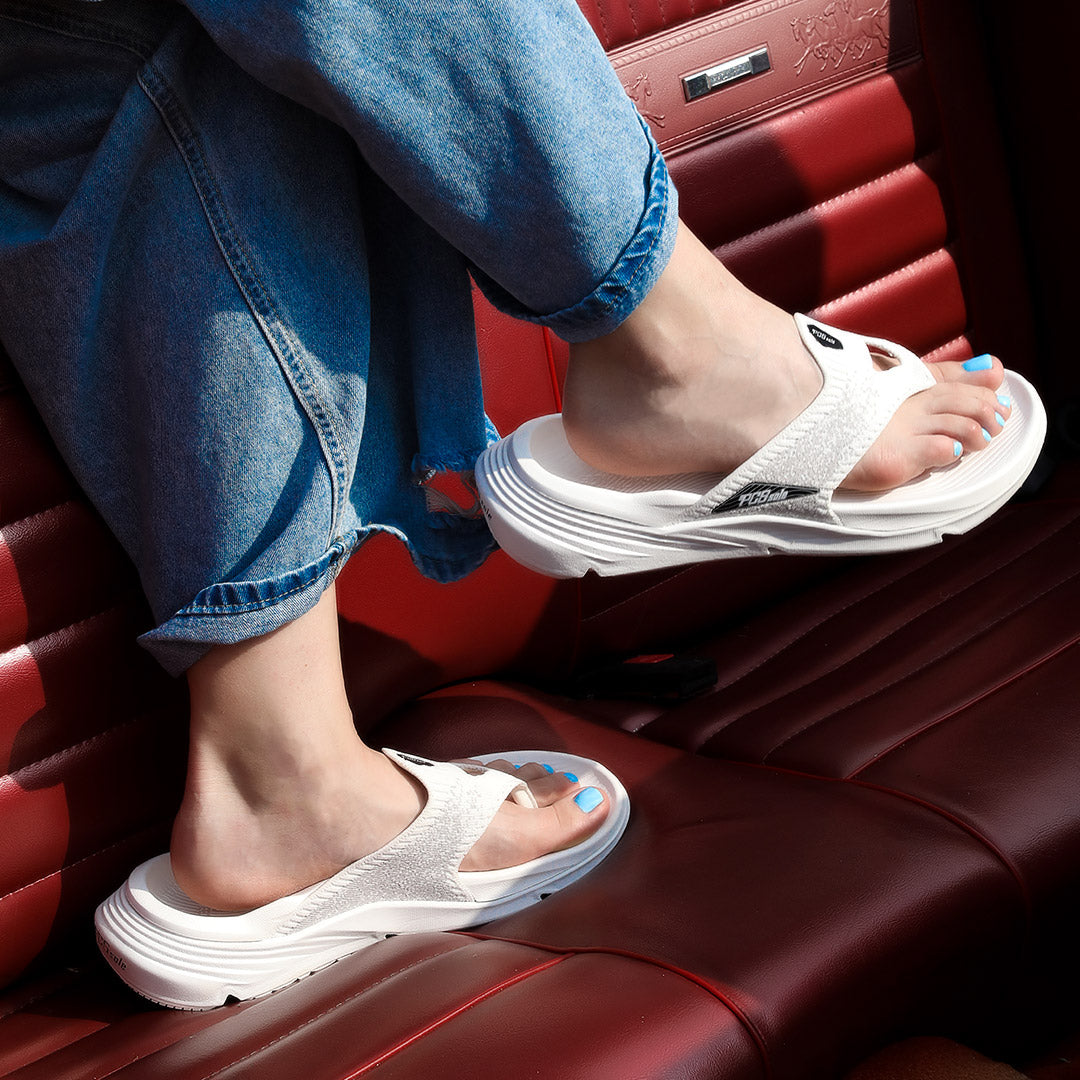
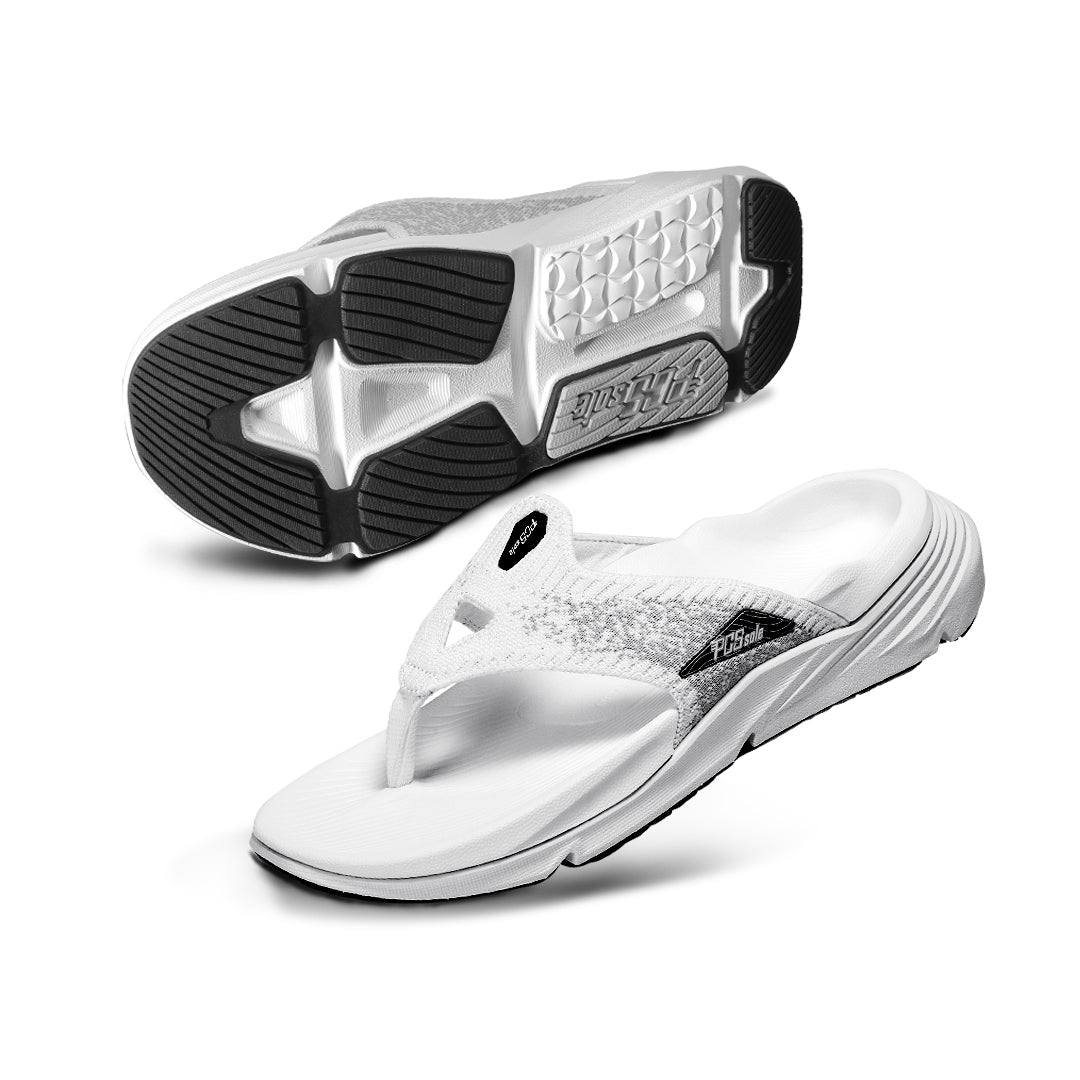
Aktie:
Der schnellste Weg, einer Plantarfasziitis Lebewohl zu sagen, ist …
Was sind Fußschmerzen? Wie kann man Fußschmerzen in 30 Sekunden lindern?